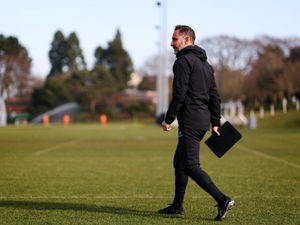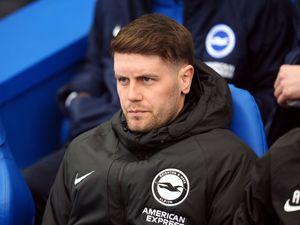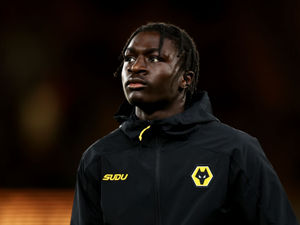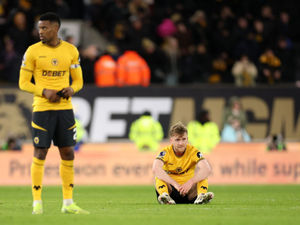Former Wolves striker Sylvan Ebanks-Blake is now passing on his knowledge
Wolves bring the curtain down on their Premier League season against Manchester United on Sunday. For one former ‘Wanderers Number 9’, there are special memories of spells at Molineux and Old Trafford.
Sylvan Ebanks-Blake is reminiscing.
“I have never really been a morning person,” reveals the former Wolves striker.
“I’d be in a car school with people like Foles (Kevin Foley) who were really lively but I would barely say a word on the journey to Compton.
“By the time we got out for training I’d be a bit more chatty and then I soon made up for it later on in the day.
“That’s football though – it’s how you get to know everyone’s characters in the dressing room, the range of their moods, just like in a family.
“And you spend so much time with your team-mate that a family is exactly what it becomes.
“For me, Wolves was just such a special time, not just personally but for everyone at the club.
“All the people around the place, they were part of it, even now I think about Eric the Chef, Foz (press officer) god rest his soul, the physios, Trev and Morts the kitmen.
“You see these people pretty much every single day for maybe four or five years of your life and that is a long, long time.
“We all had such a great bond, and it’s a time of my life that I will always cherish.”
For Ebanks-Blake, like so many of that largely youthful squad who earnt their coveted Premier League opportunity by virtue of winning the Championship title, they certainly lived in the moment.
A Band of Brothers who worked hard, and played hard, and were so much more than the sum of their parts.
But also, as time has passed, they have perhaps realised just how special that era actually was in relation to their respective footballing journeys.
“You only ever get one dressing room like that in your career, maybe two if you are lucky,” says Ebanks-Blake.
“A dressing room where it all comes together and everyone at a club gets on so well – manager, staff, players, fans.
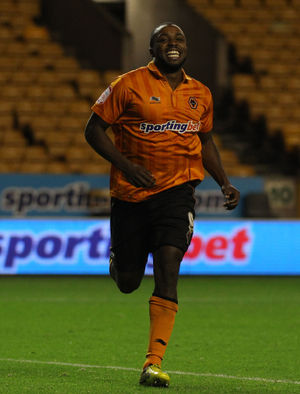
“We just connected, and it was the best squad I was ever a part of.”
We haven’t even spoken about football yet, just the togetherness and camaraderie which surrounded Wolves in that era, but maybe that isn’t a surprise.
Because, growing up, Ebanks-Blake wasn’t one of those countless numbers of young hopefuls with a burning desire to become a footballer.
That’s not to say the young Cambridge-born striker didn’t have a sporting pedigree – far from it.
Named after a racehorse, Ebanks-Blake and his two brothers enjoyed a variety of sports including rugby and basketball but even though football was a particular passion - he was playing at youth level for home town club Cambridge United – there were no real lofty aspirations.
That was soon to change.
Manchester United’s extensive scouting network across the area spotted the young striker’s talents, he went for a two-week trial whilst still at school, and ultimately was offered a full-time Academy scholarship at the end of his education.
“I went up there with my eyes wide open, without any real expectations, and I relished it,” Ebanks-Blake recalls.
“There was no social media in those days, no one telling me it was a great opportunity and I had to do this or do that, and I wasn’t scared at all about leaving home.
“I enjoyed every single minute of it, I learned and I improved, and I wasn’t even thinking about what might happen if it didn’t work out.
“I think maybe that was in part because I didn’t grow up desperately wanting to be a footballer.
“When I was a kid I didn’t have that ambition and while I was good at sport at school, I just enjoyed playing football and it just carried on.
“My parents weren’t putting any pressure on me either – when I went to United it was a case of ‘go and do as well as you can, son’ – and if it didn’t work out I was just thinking I’d go back home and do something else.”
It did work out in the sense of making two senior appearances for Manchester United, both in the Carling Cup, a late debut at 17 away from home against Crewe, and then at Old Trafford in a 4-1 win against Barnet when he rounded off the scoring.
“It doesn’t matter who it was against – it could have been a pub team,” says Ebanks-Blake.
“I played and scored for Manchester United at Old Trafford, and that’s a moment that will never ever leave me.”
Ebanks-Blake enjoyed a loan spell with Royal Antwerp, and when the day came to move on from Manchester United, amid the crushing disappointment there was also perversely a show of faith from Sir Alex Ferguson that did as much as anything to provide the drive and determination which the striker would take forward.
“Sir Alex called me into his office and told me that I was a good player and could go on and have a career in the game,” Ebanks-Blake explains.
“He said I wasn’t quite ready for Manchester United but that I should go off and have a career somewhere else.
“Alex Ferguson knows more than most about young players, and him telling me that put a battery in my back to be honest.
“I was disappointed to leave because when you are in the system at a club like that you have the belief that you can play for Manchester United, and I did that a couple of times.
“It was always going to be unlikely that it would lead to anything more, but for Sir Alex to say that just gave me a boost and a mentality that I would be able to go and be successful somewhere else.”
Sometimes in football it can be about taking one step back to take another two forward.
Within 18 months Ebanks-Blake had made sufficient progress with the Pilgrims of Plymouth that Wolves, in the same division albeit perhaps looking more upwardly mobile, met his release clause of £1.5million.
“I loved it at Plymouth,” he recalls.
“It was brilliant for me, a great learning curve with the senior players and a good manager in Ian Holloway, and passionate fans in an area where they were the only league club for miles.
“But I was ready for a bigger opportunity and a challenge, ready to be put under more pressure.
“I was ready to try and kick it on to that next level and Wolves were perfect in that respect.”
First impressions are important, so they say.
Ebanks-Blake didn’t make the best one, missing a good chance on his debut in a disappointing 3-0 defeat at home to Crystal Palace that was highlighted by boss Mick McCarthy in the post-match debrief 48 hours later.
“I remember thinking, ‘wow, what an introduction’,” he recalls with a laugh,
“But my mentality around that time was that I was bulletproof.
“Although some people might have buckled hearing that a first team meeting it didn’t affect me.
“What also helped was that I arrived in the January and was having a good season so my confidence was high.”
And so it proved.
Ebanks-Blake scored in his next appearance, away at Scunthorpe, and then the next, at home to Sheffield Wednesday, adding 12 for Wolves that season to the 13 already notched for Plymouth.
As if to prove once wasn’t enough, he then went on to bag 25 goals for a second successive season, and win a second successive Golden Boot, as Wolves stormed to the 2008/09 Championship title.
It was a fantastic team effort, built on the exuberance of youth, a hunger and determination, an almost fearless mix of talent, and that unbreakable team spirit.
“I was fortunate to get the goals and I enjoyed getting the goals but everyone in that team had a role to play,” says Ebanks-Blake.
“I didn’t take on every player in the team to score 25 goals, the other lads were setting me up, and then everyone else was keeping the ball out of the net at the other end.
“I wouldn’t say we had a feeling we were going to get promoted that second season, we just had a great set of lads and a great dressing room.
“Looking back, that dressing room deserved everything that we achieved.
“We had a lot of lads the same age, with that little bit of experience from Jody (Craddock) and Lumes (Chris Iwelumo).
“But I think that helped, the fact we only really had Jody who had played at a higher level and he was a player who led more by example.
“We didn’t have players who had been there and done it who would maybe pass on their experience which might have changed our outlook and made us realise what was at stake.
“It was almost like going into the unknown, we hadn’t experienced it before so just went out there without any fear trying to win every single game.
“Before we knew it we had started the season with a draw and seven wins on the bounce and as we got towards the business end of the season, we were able to get the job done.”
And then there was McCarthy. And his trusted assistant, Terry Connor.
Both extremely driven, extremely demanding, just as much on the training ground from Monday to Friday as in the pursuit of a positive result on a matchday.
That perhaps, those training sessions in the week, was not a time that Ebanks-Blake operated at his best.
“When GPS came in that was the worst day of my career,” he admits, tongue ever so slightly in cheek!
“I was probably in Mick’s office every week looking at my training stats!”
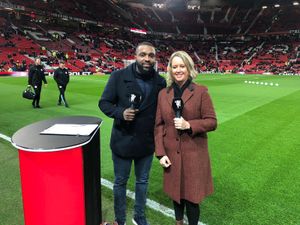
But McCarthy gave him leeway.
Of course Ebanks-Blake still had to work hard, training sessions under McCarthy involved the wearing of shin pads they were so competitive, and hard graft couldn’t be avoided.
But where he really came alive was at 3 o’clock on a Saturday afternoon, or whenever the games were played, finding pockets of space, shouldering the responsibility of that coveted Wolves number nine shirt, and aiming to find the back of the net, every single time.
Ebanks-Blake did get a bit of leeway when it came to training, perhaps also even in warm-ups, but that was only because he was regularly hitting the onion bag.
And if you take the most incredible of goals despatched at Charlton a couple of months into his Wolves stay, the pace, the power, the single-minded belief, how many other strikers could have scored like that from the position where he picked up the ball?
“I think it was just really good management,” Ebanks-Blake says of the way McCarthy ran his squad.
“Nowadays you probably wouldn’t get away with it as things are so intense.
“But Mick was a great man manager, he always had a sense of everything that was going on, on a daily basis.
“He knew how to treat players to get the best out of them, he had that give and take when it was needed, and not just with me but others as well.
“And then you had TC who is a good coach, a really good coach.
“He would always give you everything you needed to improve on the training ground, and knew when you needed to do extra or when you had done enough.
“That combination was another reason why we were so successful.”
McCarthy’s man management also allowed for the odd bit of downtime for the Wolves squad, whether a fancy dress Christmas party, night out in Ireland during pre-season – including a synchronized text message to the boss to request an extra hour’s grace – or an equally crucially-timed mid-season break to La Manga during that promotion season.
It was a squad that played hard just as much as it worked hard.
Thus it was no surprise that McCarthy’s departure off the back of a crushing local derby defeat in early 2012 was so tough to take for so many within the dressing room.
Ebanks-Blake remains adamant to this day that without that decision, Wolves would have stayed up.
“I was upset when Mick left as I think a lot of the lads were,” he recalls.
“I said at the time I thought it was hasty and I stand by thinking that we would not have been relegated if Mick had stayed.
“Things may have changed at the end of that season but I think we would have stayed up.
“From the outside looking in, we had got beat 5-1 in a derby game and that’s not good by any stretch of the imagination and I absolutely ‘get’ that.
“But the feeling within the place, well I was inside the football club, and I am convinced we still had enough and that group would have kept us up.
“We had done it before, and there was a third of the season left to go, and we were absolutely still behind Mick, without a doubt.”
The strength of that working relationship between Ebanks-Blake, McCarthy and Connor was illustrated by the fact that when he himself moved on from Wolves, his next port of call after recovering from a serious injury was the Ipswich side where the two were now in situe.
Unfortunately there was to be no fairytale reunion.
The broken fibula and ankle ligament damage Ebanks-Blake had sustained in his final Wolves appearance at Birmingham City had carried lingering effects and the striker was nowhere near his predatory best.
“Before Mick left, he had told me if he ever needed a striker I would be the person he called upon,” Ebanks-Blake explains.
“And he was true to his word.
“It didn’t really work out and we didn’t speak for a good while after my time at Ipswich, nothing major, but for various reasons time just passed by.
“It had been in my mind to speak to him and I am really happy that we did chat not so long ago.
“Like I say it wasn’t like a big falling out or anything like that but things move on in football and it was just nice to kind of bury what had happened and catch up again.
“He did so much for my career and for my family and was like a father figure to so many of us because of our ages and things that were happening in our lives at the time.
“He was the perfect manager for that group of players at that part of Wolves’ history.”
McCarthy’s departure heralded the loss of stability which had become the norm under his tenure, and by the time Wolves suffered their second successive relegation – this time to League One – Connor, Stale Solbakken and Dean Saunders had all occupied the hotseat with Kenny Jackett next to arrive.
Ebanks-Blake however continued to keep scoring, 15 goals in his final season ended by the brace which propelled Wolves into a 3-0 lead and ultimately three points away at St Andrew’s prior to picking up the serious injury.
On a run of four goals in five games, and with others like Kevin Doyle also in some form, there is perhaps an argument that with Ebanks-Blake’s premature end to the season so too went Wolves’ Championship status.
“Maybe we would have skimmed it and stayed up, I don’t know, but I would say that the season we went down from the Championship felt very different to the one before when we went down from the Prem,” he argues.
“We can talk about various situations but that season, I think we probably ended up where we were supposed to.
“The feeling about the place that year was that everything wasn’t really where it needed to be and while personally I did o-k I think as a collective we just weren’t in sync.”
There were several other stints for Ebanks-Blake after Ipswich, including Preston – who were promoted from League One – Chesterfield and Shrewsbury.
His love for the game also meant, like many others from his era at Wolves, that he continued to play in non-league for as long as possible, including with Telford, Halesowen Town, Barwell and Walsall Wood.
Far cry from the Premier League, where Ebanks-Blake struck ten goals, including one at midweek opponents Everton, but there is the impression that, as with any striker, that desire and determination to find the net – at whatever level – never quite goes away.
Ebanks-Blake had a knack of providing those goals at crucial moments, not just the spectacular as at Charlton but others which were of major importance to his team.
Take for example the promotion-clincher on a memorable Molineux afternoon against QPR after he had been struggling with a hamstring injury, or the late equaliser against Blackburn the following season which ultimately secured Premier League status.
He also scored on a return back to Old Trafford, ultimately in a defeat, but struck late for another dramatic win against Sunderland at Molineux.
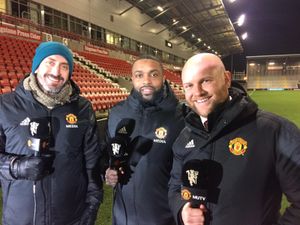
“I always believed I could score goals at the top level,” says Ebanks-Blake, who was capped by the England Under-21’s.
“It is harder because you do get fewer chances and unfortunately I also picked up a few injuries.
“Maybe ten goals isn’t a great return but I proved to myself I could do it and am happy with that figure based on how my career ended.
“Leaving Wolves was tough but I understand why it happened and I think the reset has helped the club to get to where they are now, which is fantastic to see.
“For me, and the other lads who ended up in non-league, it was just because we enjoyed our football so much and wanted to keep going as long as we could.
“Rather than travelling all around the country, sometimes you get to a point in your career where you want to live locally, be able to take your kids to school and still enjoy your football.
“You get to the stage where happiness is probably more important than anything else.
“The reality of football is that most players often kind of go out quietly, very rarely do you end on a high.
“For me, I feel I played for the very best clubs I wanted to and very lucky particularly to have the memories I had at Wolves.”
Since calling it a day a couple of years ago, Ebanks-Blake has pretty much kept options open as to a future career, and has enjoyed working for MUTV – Manchester United’s TV station – summarising on games across many of the club’s different age groups.
He has also recently started working alongside a friend and business partner advising young players, making use of all his experiences in the game - good and bad - to try and help emerging talent make the right decisions.
It is a development he is greatly enjoying.
“I think there is a lot of bad advice out there, and I want to try and help young players, especially as I have experienced so much in football,” he says.
“I can hopefully give them good advice, not to make some of the mistakes I did, and to do things differently when needed.
“My business partner is involved with contacting clubs and doing the deals but for me it’s about offering sound advice from a player standpoint.
“I think I can relate to players when they are going through difficult times or when they are going really well – I have had the lot!
“It is something I am really passionate about and for both of us who are involved it isn’t about money or doing a deal – it’s about what is right for the individual player at each stage of their career.”
Alongside this new and exciting stage in his football career, Ebanks-Blake remains in touch with many of his former Wolves team-mates, several of whom have stayed in the Midlands long after their Molineux careers had run their course.
Indeed, not long before the pandemic arrived, there was also the chance to catch up with a good old-fashioned night at the pub!
Among the group there has been one particularly close and special friendship which has proved especially important over recent times.
Ebanks-Blake and Carl Ikeme took some time to strike up an alliance when first occupying the same dressing room – both are deep thinkers who tend to sit quietly and size people up before passing judgement!
When Ikeme was diagnosed with leukaemia four years ago, Ebanks-Blake was among the inner circle of friends who then spent the following 12 months keeping in regular touch, making regular visits, and generally being there to help his mate through some seriously tough times.
“To be honest Carl is like my brother,” Ebanks-Blake explains.
“I don’t think you meet too many people in life where the connection is so real and it’s a great friendship.”
Ebanks-Blake joined another close friend in Foley to support Ikeme by raising funds for charity with a bike ride during his illness, and also linked up with the former goalkeeper for a night raising awareness of the Race Against Blood Cancer charity with Telford Wolves just before the first lockdown.
The incredible warmth in the room that night offered another sign of just how much the two of them are still revered by the Molineux fanbase.
It is now coming up to eight years since Ebanks-Blake left Wolves, and circumstances dictated that there could be no fond farewell or proper chance to say goodbye.
It is also difficult to remember any sort of fan dissent directed towards ‘Wanderers Number 9’, even during such a turbulent time with the double relegations.
Instead, there is a generation of Wolves fans who will forever sing very different lyrics to the chorus of ‘Baby Give It Up’ by KC and the Sunshine Band.
Ebanks-Blake has enjoyed an enduring popularity with Wolves fans which means a lot and is something he will never take for granted.
“I have nothing but good things to say about Wolves fans, and I have so much gratitude towards them,” he says.
“The experiences I was able to have at Wolves, and those good times shared with fans, will never ever be forgotten.
“Those moments of complete euphoria, or the anxiety because we didn’t get a result – all those range of emotions you get in football, all shared together.
“No amount of money could ever pay for that feeling, and no one can ever take it away from you.
“I can’t ever remember a situation where I had a run-in with Wolves fans even to this day, and it is still great to see them.
“Not so long ago I went to pick up a bike from a shop in Wolves, and a fan was coming towards me walking down the street.
“He just stopped me and said ‘thanks for the memories’ and I said thank you back and we carried on walking.
“It just blows my mind if I’m honest, to get that sort of comment, it’s incredible.
“For someone to want to stop and say that to me, and then we both just carry on with our day, for me that is so powerful.”
It’s quite an image, and quite a quote. And an illustration of how, thinking back to those Molineux times of a decade or so ago, will always bring smiles and fond memories for the now 35-year-old Ebanks-Blake.
Yes, even in the morning!

